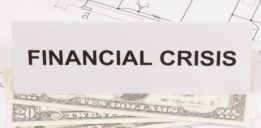Retirement Crisis Brewing, Dire consequences Likely
There is an immense retirement crisis brewing in the United States. It won’t end well for anyone; it could even lead to an outright economic crisis.
Here’s the sad part: it may already be too late to do anything about it now. The damage is done.
You won’t hear about it much in the mainstream media, but pension funds across the U.S. don’t have enough money to cover their future payments. The term for this is “unfunded liabilities.”
How much do retirement funds need in order to cover their future payments? The pension funds administrated by state governments alone have unfunded liabilities of about $6.0 trillion. (Source: “State Pension Unfunded Liabilities Nearly $6 Trillion,” Chief Investment Officer, March 29, 2019.)
This is not a small figure. For some perspective, consider this: the amount required by the state-sponsored funds is bigger than Japan’s gross domestic product (GDP).
Where Will $6.0 Trillion Come From?
Now, if you add pension funds administered by municipal governments, this figure gets much bigger. If you want to get even more concise, add pensions that are administered by private-sector companies.
But let’s just work with the $6.0 trillion figure for now. Where will this money come from?
You see, managers of pension funds hope to make investments that will generate a decent return on the money they have, in order to make future payments to retirees. Their strategy is pretty straightforward: take in money from participants, make investments, and make payments to those who have reached retirement age.
This leads to another question: where will retirement funds invest their money to recover the $6.0-trillion gap in funding?
Will they buy stocks? At the moment, stock valuations are extremely expensive. If retirement funds dabble more in the stock market, they could risk losing a lot of money if there’s a massive sell-off in the next few years.
Will they buy bonds? Well, bonds are not paying much these days. Assuming that pension funds go all in on bonds, their return on investment could end up being pennies on the dollar. Currently, the 30-year U.S. Treasury has a yield of about 2.2% and inflation is running at about two percent. So, by holding these bonds, retirement funds would only make about 0.2% on real basis.
Or, will these funds jump into markets like private equity and venture capital? If they do that, it will create a lot of liquidity issues. Remember, pension funds need to make payments to those who have contributed for years. Private equity and venture capital are illiquid markets and are awfully uncertain.
Here’s How a Retirement Crisis Turns Into an Economic Crisis
Dear reader, as I said before, pension funds in the U.S. really have no way out, given the current investment environment. It’s very unlikely that they will recover $6.0 trillion in unfunded liabilities quickly.
I wouldn’t be shocked if the retirement crisis gets bigger. Why give the situation such a gruesome name? Because the retirements of many Americans are on the line.
Imagine what would happen if, all of a sudden, pension funds tell retirees, “We can’t pay you.” Don’t you think that would have a massive impact on the U.S. economy? I think it could be devastating and create a severe economic crisis.
I also ask this: will the U.S. federal government step in to end this retirement crisis now, or will it wait until things get much worse?
With time, we will know more, but it’s not looking good.






